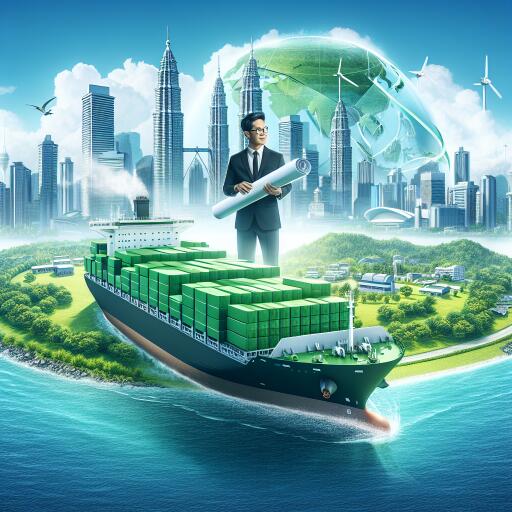
Emphasising Green Shipping: Malaysia’s New Maritime Necessity
As the global maritime landscape tilts towards sustainability, Malaysia faces a pivotal opportunity to integrate green shipping initiatives to safeguard its competitive edge and bolster its environmental credentials. To navigate this transition effectively, Malaysia can craft dedicated policies that advocate the adoption of cleaner fuels and green technologies, particularly in light of energy-efficient port requirements. This shift requires a comprehensive legal framework that aligns with global standards to promote sustainable practices across the maritime industry.
The alignment with international standards, such as the International Maritime Organisation’s (IMO) Energy Efficiency Design Index and Carbon Intensity Indicator, is essential. These frameworks offer systematic emission reduction mechanisms applicable to both new constructions and pre-existing vessels, thereby enhancing Malaysia’s relevance in the increasingly eco-conscious global market. The European Union has already set a precedent by implementing the FuelEU Maritime regulation, enforcing a gradual transition to low-carbon and renewable fuels for ships docking at EU ports, with full enforcement commencing by January 1, 2025. This regulation aims to decarbonise the maritime sector by integrating cleaner energy solutions.
Implementing robust monitoring systems and establishing fair compliance measures can secure confidence among market participants in meeting green shipping demands. Malaysia could consider emulating initiatives like the Green Ship Programme, which incentivises energy-efficient innovations in line with IMO objectives, fostering a culture of sustainability within maritime operations. Adopting similar policies will not only propel Malaysia’s maritime organisations toward prioritising eco-friendly practices but also encourage significant investments in renewable technologies.
Furthermore, financial incentives such as tax exemptions and green funds, as demonstrated by neighbouring nations, could serve as catalysts for increased investments in cleaner technologies and green systems. However, Malaysia’s current landscape presents challenges; the cost of capital for green shipping is significantly higher than for traditional vessels, and financing rates are less competitive comparatively. Despite these hurdles, Malaysia’s strategic position along the Strait of Malacca offers considerable potential for attracting foreign investments and testing new green shipping methods.
Balancing Economic Growth with Environmental Responsibility
Peninsular Malaysia occupies a crucial spot along one of the world’s busiest maritime pathways, providing a unique advantage in trade, albeit with environmental costs. Malaysia must balance economic opportunities with conserving its marine ecosystems to maintain ecological integrity. Threats from oil spills and marine pollution pose significant risks to delicate marine environments, including mangroves, coral reefs, and marine biodiversity.
Malaysia’s long coastline and rich marine resources are not just economic assets but are intertwined with its cultural identity. As a nation with deep maritime roots, fostering sustainable maritime practices is paramount to preserving its historical and ecological legacy.
Hydrogen and Malaysia’s Green Economy
Malaysia’s ambition to lead the green hydrogen market in the region is encapsulated in the National Energy Transition Roadmap (NETR), which aims to establish a low-carbon hydrogen hub by 2030 and achieve 70% renewable energy capacity by 2050. Sarawak, with its pivotal role in this trajectory, is poised to become a central player. The upcoming Tanjung Embang deepsea port project in Kuching will further enhance Malaysia’s strategic position by facilitating green hydrogen bunkering and other energy exports/imports.
The hydrogen development strategy aligns seamlessly with national emission objectives, offering a carbon-neutral solution for various sectors, including power generation and heavy transport. When derived from renewable sources like hydroelectric power, hydrogen effectively supports Malaysia’s broader NETR strategy.
By positioning itself as an early adopter of hydrogen technologies, Malaysia can assert its dominance as a key hydrogen supplier within the region, contributing significantly to ASEAN’s goal of an interconnected and sustainable power grid. This regional leadership could propel Malaysia to guide collective climate action through the adoption of hydrogen technologies and foster collaboration across the region to achieve common environmental targets. This strategic focus on hydrogen not only propels research and development but also opens new export avenues for Malaysia.





Leave a Reply